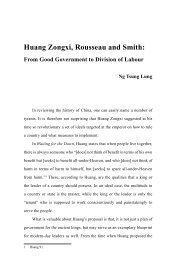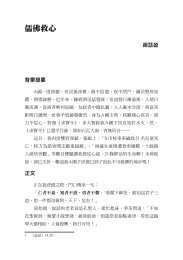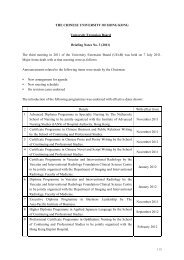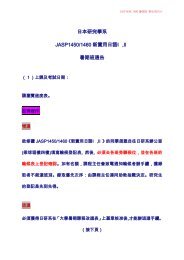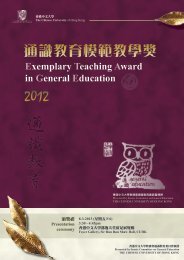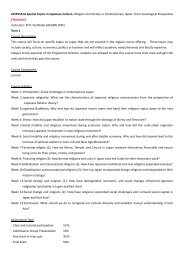ä¸è¼å ¨æ¸ - The Chinese University of Hong Kong
ä¸è¼å ¨æ¸ - The Chinese University of Hong Kong
ä¸è¼å ¨æ¸ - The Chinese University of Hong Kong
Create successful ePaper yourself
Turn your PDF publications into a flip-book with our unique Google optimized e-Paper software.
Susan Gano-Phillips, Affective Learning in General Education 35<br />
allowed us to consider how well students had achieved the affective ILO.<br />
<strong>The</strong> final mechanism for assessing the affective ILO came from an<br />
Integrative Reflective paper assignment entitled, “What I have learned<br />
about ethics in public life.” Through this paper, the students’ comments<br />
demonstrated the value that they placed on being able to examine the<br />
relationship between codes <strong>of</strong> ethics and individual ethical behavior. One<br />
student commented, “Personally, the symposia gave me the chance to look<br />
at the world with a more critical eye. I now see that ethics isn’t a class or a<br />
random scenario, but something that is a part <strong>of</strong> you; like character.” While<br />
these statements are qualitative and anecdotal, and on their own would not<br />
provide sufficient evidence <strong>of</strong> the achievement <strong>of</strong> the affective ILO, they<br />
certainly supplemented the other assessments and attested to the fact that the<br />
students valued the development <strong>of</strong> their ethical decision-making skills.<br />
Conclusions — On the Opportunity and Challenges <strong>of</strong><br />
Affective Learning<br />
Affective learning outcomes are essential components <strong>of</strong> a 21 st century<br />
university education, as exemplified in statements <strong>of</strong> graduate outcomes,<br />
various accreditation standards, and employer surveys internationally.<br />
Though less familiar to most faculty than cognitive learning outcomes,<br />
affective learning outcomes are no less salient or critical to student success<br />
in the ever-changing, multicultural, global, information-laden society in<br />
which we live. In fact, some argue that affective learning outcomes are more<br />
important for the success <strong>of</strong> graduates and the success <strong>of</strong> society than are<br />
many <strong>of</strong> the specific cognitive outcomes emphasized in current programs.





